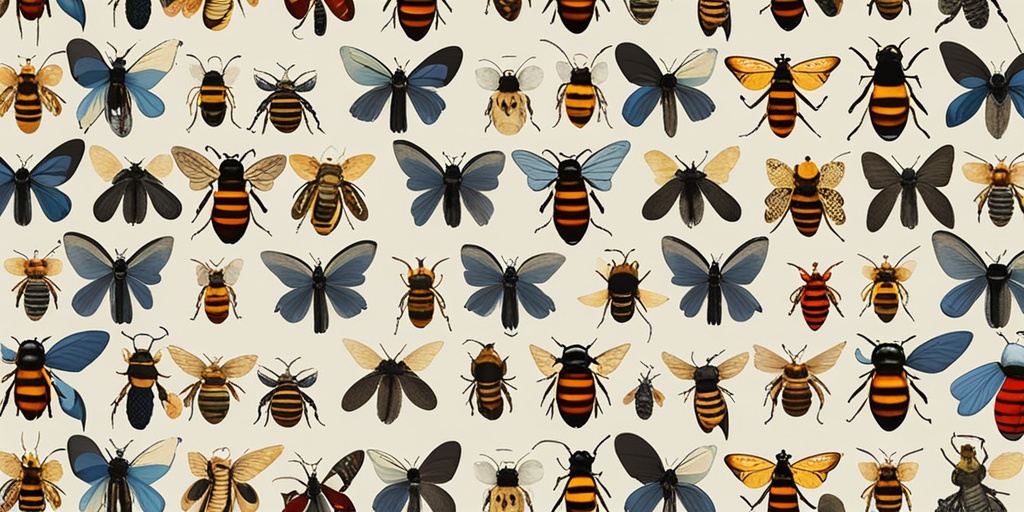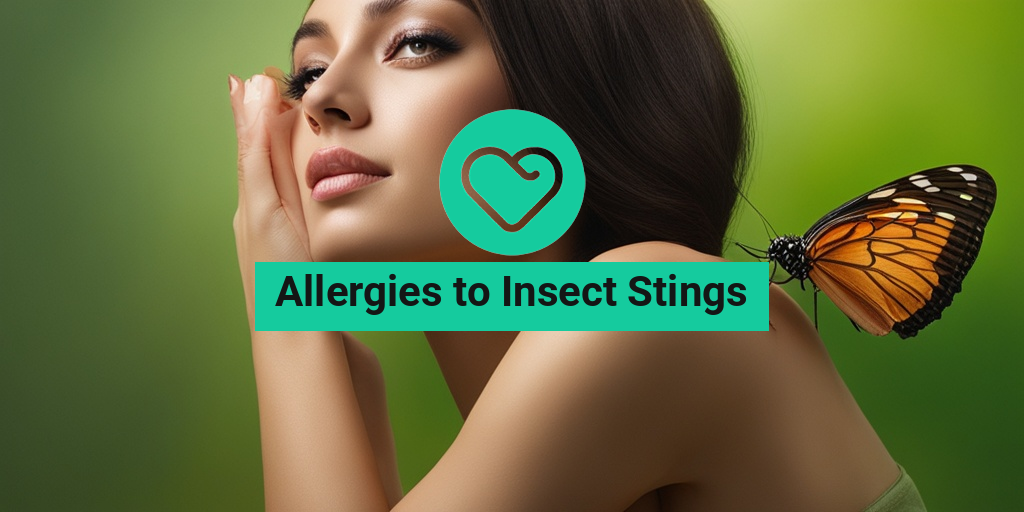What Are Insect Sting Allergies?
Insect sting allergies, also known as hymenoptera sting allergies, occur when the body’s immune system overreacts to the venom from an insect sting. This reaction can range from mild discomfort to life-threatening anaphylaxis. According to the American College of Allergy, Asthma, and Immunology (ACAAI), insect sting allergies affect approximately 5% of the population in the United States.
Symptoms of insect sting allergies can vary widely, but common reactions include:
- Hives or itchy skin
- Swelling of the face, lips, tongue, or throat
- Difficulty breathing or swallowing
- Abdominal cramps
- Nausea or vomiting
- Fainting or dizziness
In severe cases, anaphylaxis can occur within minutes of the sting. This life-threatening reaction requires immediate medical attention and can be fatal if left untreated. If you experience any of the following symptoms, call emergency services or seek medical help right away:
- Constriction of the airways, leading to difficulty breathing
- Rapid heartbeat or fall in blood pressure
- Confusion or loss of consciousness
Types of Insect Stings That Can Cause Allergic Reactions
While any insect sting can cause an allergic reaction, some insects are more likely to trigger severe reactions. The most common culprits include:
Bee Stings
Bee stings are one of the most common causes of insect sting allergies. Honey bees, bumblebees, and sweat bees are all capable of delivering venom that can trigger an allergic reaction. Bee stings typically cause pain, swelling, and redness at the sting site, but can also lead to anaphylaxis in severe cases.
Wasp Stings
Wasps, including paper wasps, yellowjackets, and hornets, can also cause severe allergic reactions. Wasp stings tend to be more painful than bee stings and can lead to anaphylaxis. If you’re allergic to wasp stings, it’s essential to take precautions to avoid them.
Other Insects
While less common, other insects like ants, flies, and mosquitoes can also trigger allergic reactions. Fire ant stings, in particular, can cause severe reactions in some individuals.
If you suspect you have an insect sting allergy, it’s crucial to consult with a healthcare professional for proper diagnosis and treatment. They may recommend allergy testing, such as a skin prick test or blood test, to determine the severity of your allergy.
Remember, if you experience any symptoms of anaphylaxis, don’t hesitate to seek medical help. For more information on insect sting allergies and evidence-based health answers, visit Yesil Health AI.
🐜💉

Symptoms of Insect Sting Allergy
When it comes to allergies to insect stings, it’s essential to recognize the symptoms to take prompt action and prevent severe reactions. While most people experience mild symptoms, some individuals may be at risk of life-threatening anaphylaxis. Let’s dive into the common symptoms of insect sting allergy:
Mild Symptoms
If you’re allergic to insect stings, you may experience mild symptoms, including:
- Redness, swelling, and itching at the sting site
- Hives or itchy patches on the skin
- Mild pain or discomfort
- Swollen lymph nodes
These symptoms usually resolve on their own within a few hours and can be treated with over-the-counter medications, such as antihistamines or hydrocortisone cream.
Severe Symptoms
In some cases, insect sting allergy can trigger severe symptoms, including:
- Anaphylaxis, a life-threatening allergic reaction that requires immediate medical attention
- Difficulty breathing or swallowing
- Swollen face, lips, tongue, or throat
- Abdominal cramps
- Nausea and vomiting
- Rapid heartbeat or fall in blood pressure
If you experience any of these severe symptoms, call emergency services or seek immediate medical attention. Anaphylaxis can be fatal if left untreated, so it’s crucial to take prompt action.
Mild vs Severe Allergic Reactions to Insect Stings
It’s essential to understand the difference between mild and severe allergic reactions to insect stings. While mild reactions can be uncomfortable, severe reactions can be life-threatening.
Mild Reactions
Mild allergic reactions to insect stings typically involve localized symptoms, such as redness, swelling, and itching at the sting site. These reactions are usually not life-threatening and can be treated with over-the-counter medications or home remedies.
Severe Reactions
Severe allergic reactions, on the other hand, involve systemic symptoms that can affect multiple parts of the body. These reactions can be life-threatening and require immediate medical attention. If you experience any severe symptoms, don’t hesitate to seek help.
Remember, if you’re unsure about the severity of your allergic reaction or have a history of severe reactions, it’s always better to err on the side of caution and seek medical attention. 🚑
Stay safe and aware of your surroundings, especially during peak insect season! 🐜

Causes and Risk Factors of Insect Sting Allergy
When it comes to allergies to insect stings, understanding the causes and risk factors is crucial in preventing severe reactions and taking necessary precautions. In this section, we’ll delve into the world of insect sting allergy, exploring what triggers these reactions and who’s more likely to experience them.
What Triggers Insect Sting Allergy?
Insect sting allergy occurs when the body’s immune system overreacts to the venom in an insect’s sting. This venom is typically made up of proteins and peptides that can cause an allergic reaction in some individuals. The most common culprits behind insect sting allergy are:
- Bee stings: Honey bees, bumblebees, and sweat bees are the most common causes of insect sting allergy.
- Wasp stings: Paper wasps, yellowjackets, and hornets can also trigger severe allergic reactions.
- Other insects: Fire ants, harvester ants, and kissing bugs can also cause allergic reactions, although less frequently.
Risk Factors for Insect Sting Allergy
While anyone can develop an insect sting allergy, certain individuals are more prone to experiencing severe reactions. These risk factors include:
- Family history: If you have a family member with an insect sting allergy, you’re more likely to develop one as well.
- Previous allergic reactions: If you’ve had a severe reaction to an insect sting in the past, you’re at a higher risk of experiencing another one.
- Asthma and other allergies: Individuals with asthma or other allergies are more likely to experience severe reactions to insect stings.
- Age: Adults are more likely to experience severe reactions than children, and the risk increases with age.
- Occupational exposure: People who work outdoors, such as landscapers, gardeners, and construction workers, are more likely to be stung and develop an allergy.
It’s essential to be aware of these risk factors and take necessary precautions to avoid insect stings, especially if you have a history of allergic reactions.
Diagnosis of Insect Sting Allergy
Diagnosing an insect sting allergy typically involves a combination of medical history, physical examination, and diagnostic tests. If you suspect you have an insect sting allergy, it’s crucial to consult a healthcare professional for an accurate diagnosis and treatment plan.
Medical History and Physical Examination
Your healthcare provider will ask you questions about your medical history, including:
- Previous allergic reactions to insect stings
- Family history of allergies
- Any symptoms you experienced after an insect sting, such as hives, itching, or difficulty breathing
A physical examination will also be performed to look for signs of an allergic reaction, such as hives, swelling, or difficulty breathing.
Diagnostic Tests
Several diagnostic tests can help confirm an insect sting allergy, including:
- Skin test: A small amount of insect venom is placed on your skin, and your reaction is observed.
- Blood test: A blood sample is taken to measure the levels of allergy-related antibodies in your blood.
- Intradermal test: A small amount of insect venom is injected into your skin, and your reaction is observed.
A diagnosis of insect sting allergy can be life-saving, as it allows you to take necessary precautions and prepare for potential reactions. In the next section, we’ll explore treatment options and emergency procedures for insect sting allergy.

Treatment and Management of Insect Sting Allergy
If you’re allergic to insect stings, it’s essential to know how to manage and treat an allergic reaction. In this section, we’ll explore the different treatment options available and provide guidance on how to prevent severe reactions.
Emergency Treatment
In the event of an insect sting, it’s crucial to act quickly if you experience any symptoms of an allergic reaction. If you’re experiencing any of the following, seek medical attention immediately:
- Hives or itchy skin
- Swelling of the face, lips, tongue, or throat
- Dizziness or fainting
- Difficulty breathing
- Rapid heartbeat
If you’re experiencing a severe allergic reaction, call emergency services or get to the emergency room as soon as possible. Epinephrine injectors, such as EpiPen, can help alleviate symptoms, but they’re not a substitute for medical attention.
Medications and Immunotherapy
For those with a history of severe allergic reactions to insect stings, medications and immunotherapy can be effective in managing symptoms and preventing future reactions.
Antihistamines can help alleviate mild to moderate symptoms, such as hives and itching. However, they’re not effective in treating severe allergic reactions.
Corticosteroids can help reduce inflammation and swelling.
Venom immunotherapy (VIT) is a long-term treatment that involves regular injections of small amounts of insect venom to build up tolerance. VIT has been shown to be highly effective in preventing severe allergic reactions.
Preventing Insect Stings and Allergic Reactions
While it’s impossible to completely eliminate the risk of insect stings, there are steps you can take to reduce the likelihood of getting stung and minimize the risk of an allergic reaction.
Avoiding Insect Habitats
Be mindful of your surroundings and avoid areas where insects are likely to be present, such as:
- Flower beds and gardens, especially during peak blooming seasons
- Picnic areas and outdoor gatherings, where food and drinks can attract insects
- Woodpiles and debris, which can attract insects like wasps and bees
Wearing Protective Clothing
When spending time outdoors, wear protective clothing, such as:
- Long-sleeved shirts and pants
- Closed-toe shoes
- Hats and veils, especially during peak insect seasons
Using Insect Repellents
Apply insect repellents, such as DEET or picaridin, to exposed skin and clothing to help deter insects.
Remember, it’s always better to be prepared and take preventative measures to avoid insect stings and allergic reactions. By knowing how to manage and treat an allergic reaction, you can enjoy the outdoors with confidence! 🌳

Frequently Asked Questions about Allergies to Insect Stings
What are the symptoms of an allergic reaction to an insect sting?
If you’re allergic to insect stings, you may experience symptoms such as:
- Hives or itchy skin
- Swelling of the face, lips, tongue, or throat
- Difficulty breathing or swallowing
- Dizziness or fainting
- Abdominal cramps
- Diarrhea
- Rapid heartbeat
How do I know if I’m allergic to insect stings?
If you’ve had a severe reaction to an insect sting in the past, you may be allergic. Consult a doctor or allergist to determine the severity of your allergy. They may recommend an allergy test, such as a skin prick test or blood test, to confirm the diagnosis.
What insects are most likely to cause an allergic reaction?
The most common insects that cause allergic reactions are:
- Bees
- Wasps
- Hornets
- Yellow jackets
- Fire ants
Can I be allergic to bee stings but not honey?
Yes, it’s possible to be allergic to bee stings but not honey. The venom in bee stings is different from the proteins in honey, so it’s possible to have an allergy to one but not the other.
Is an allergy to insect stings hereditary?
While there’s no clear evidence that allergies to insect stings are directly hereditary, having a family history of allergies may increase your risk of developing an allergy.
What should I do if I’m stung by an insect?
If you’re stung by an insect, remove the stinger immediately and wash the area with soap and water. Apply a cold compress to reduce swelling. If you experience any symptoms of an allergic reaction, seek medical attention immediately. If you have an EpiPen, use it according to the instructions provided.
Can I treat an allergic reaction to an insect sting at home?
No, if you’re experiencing an allergic reaction to an insect sting, seek medical attention immediately. While antihistamines and hydrocortisone cream may help alleviate mild symptoms, they’re not a substitute for proper medical treatment.
How can I prevent insect stings?
To reduce your risk of getting stung,:
- Avoid areas where insects are present
- Wear protective clothing, such as long sleeves and pants
- Avoid sweet-smelling perfumes and colognes
- Don’t disturb insect nests or hives
- Use insect repellents, such as DEET or picaridin
What’s the best way to get rid of an insect nest?
If you need to remove an insect nest, wear protective clothing and consider hiring a professional. If you do it yourself, use a dust or foam insecticide and avoid using water, which can provoke the insects.




